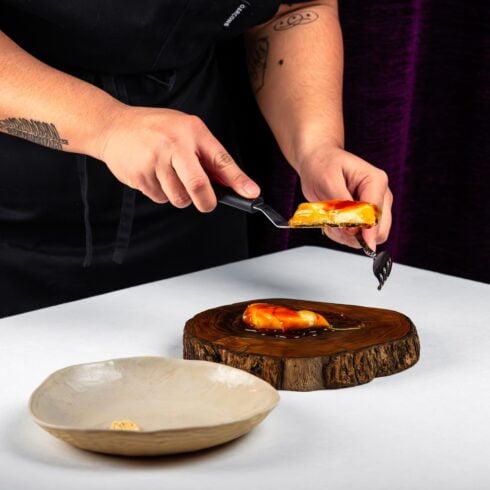Greenpeace is taking on the Spanish supermarkets over their continuing sale of endangered fish
By Chris Dove
THEY can be seen standing outside or nearby the main fish markets along the Costa del Sol. Wizened with time-worn faces and scruffy clothes they are the reason that Spain has just been fined 100 million euros by the European Union.
For these drag fishermen, or bolicheros as they are known, are selling from buckets whatever they can catch on their nightly forays along the shores of Andalucia’s once-rich coastline.
Catching contraband, underweight fishes such as baby boquerones or chanquetes, their continual flaunting of a law that has been in force since 1989 is threatening the extinction of various species of fish.
As reported in the Olive Press in issue 54 (Spain Nets Huge Fine) some 70 bolicheros alone are said to head out every night from Torre del Mar, while more than 100 bars or restaurants were found to be selling the fish along the Costa del Sol.
Now – alongside a new fine of up to 60,000 euros for catching underweight fish – Greenpeace has decided to launch a campaign to educate the country that is Europe’s biggest consumer of seafood.
Taking to the streets of 19 Spanish cities, Greenpeace activists got over 2,000 new members of their sustainable fishing campaign.
Using the slogan: “Choose your fish well – don’t take the bait”, the environmental group picketed the major supermarkets including Día, Carrefour and Eroski demanding managers stop selling 15 species found on the pressure group’s so-called Red List.
Among the species it claims are harvested, or raised, in an unsustainable manner are Angler, Hake and Sole, alongside the more popular Tuna, Atlantic Cod and Atlantic Salmon. Other seafood species in danger include the King Prawn, Swordfish and Manta Rays.
It got customers to sign postcards demanding that the supermarkets stopped selling the fish that are “damaging marine diversity”.
The campaign was launched at Madrid’s Alcampo store with a huge banner draped across the storefront declaring ‘Alcampo Destroying the Oceans’.
In Andalucia the cities of Granada, Sevilla and Malaga were targetted, with Carrefour in Malaga coming under particular attack.
“This was an opportunity for us to inform not only the supermarkets but also their customers about where their fish comes from”, said Ángel Ramajo, a Greenpeace activist.
“We have discovered that while customers want to buy seafood, they want it from sustainable sources. By signing the postcards, they make a commitment to this policy and make an impression on the store that it should care where its fish is sourced.”
He continued: “Our action is a start. It will take time but we hope to see results in less than six months.”
While many restaurants have still to get the message, there are a few that are bucking the trend.
One of the best examples is the award-winning Aponiente restaurant in El Puerto de Santa Maria, near Cadiz, where owner/chef Angel Leon is resolute in his charter to serve sumptuous seafood only from sustainable sources.
He is contracting his very own fishing boat (and crew) to work exclusively for him
Avoiding endangered species, he has been championing a large number of little-known, unfashionable fish, such as Breca, Zalema or Baila.
“The problem is how difficult they are to buy,” he explains. “Most fishermen simply leave them to die on the boat and then throw them overboard. It is a real scandal. They are just not commercially viable, but if you can find them they cost as little as 12 centimos a tonne.”
He is fighting the problem by contracting his very own fishing boat (and crew) to work exclusively for him. Working on the new project with the University of Cadiz, he sends them out with the orders of finding the fish that are not endangered.
“I just cook with what there is and experiment until I get it right,” he says. “Apoinente isn’t interested in serving glamorous fish that everybody eats; we aim to promote the little known species to the rest of the world.”
Another chef who is championing the use of sustainable fish is Stefan Crites, of Al Lago restaurant in Zahara de la Sierra. He is horrified with the amount of fish – or bycatch – that gets dumped.
“It’s an alarming fact that for every ton of fish that makes it to the market an average of three tons goes to waste,” he says. “This includes everything else that comes up in the big nets. Coral, turtles, dolphins and lots of other fish. It is a disgrace.”
He says: “Cod has been on the Red List for 15 years since coming under attack from dangerous and destructive fishing methods. But despite many predicting that the fish could soon be extinct it still finds its way into most Spanish restaurants.”
IUU – or illegal, unreported and unregulated fishing of endangered species
Now the issue is at the top of the agenda for fishing authorities meeting at the Sustainable Seafood Exhibition in Italy this week.
Part of the Slow Fish Movement, the event provides a meeting place for communities from around the world while involving the public in subjects crucial for the survival of fish species.
The theme of sustainability is continued at the end of the month at a Brussels conference titled Sustainability of the European Seafood Industry, highlighting the state of EU fisheries.
It is likely to lead to painful reading for Spain, and the European Commission is keeping a particularly watchful eye on Spain’s fishing industry.
This is not surprising given Spain’s less than healthy attitude to the environment and consistent ranking among the top three countries for serious infringements of EU Law.
Greenpeace is also keen to highlight the massive escalation of what is known as IUU – or illegal, unreported and unregulated fishing of endangered species.
In particular, the pressure group is taking an issue with Galician shipowner Vidal Armadores that has been involved in continual illegal fishing in the Southern Ocean.
Classing them as ‘pirates’ the names of nine Captains have been published on the Greenpeace website. All are Spanish nationals working aboard Vidal ships including Belma, Galaecia and Paloma V.
Luckily, Brussels is now getting in on the act with the EC’s Fisheries Commissioner recently complaining to Spain over its lack of action over IUU boats.
In a letter he wrote that the EC position cannot be “internationally undermined” by the suspicion that a fishing company has confirmed relations with IUU vessels.
It added: “This is not the first situation allegedly involving Vidal Armadores… The EC will take any legal action necessary to ensure the implementation and respect of the EC Law.”
We have heard that before, but perhaps now Spain will take the bait!
Learn more about the Greenpeace Spain sustainable fishing campaign at http://www.greenpeace.org/espana/news/090331-02
Click here to read more News from The Olive Press.







Spain could tackle this problem overnight. First, enforce and arrest all bolicheros and their agents ensure they don’t come back the next day and do it again by giving them a month in prison for a first offence and then a year in prison the next time (they are serial reoffenders). Is not the extinction of a species a cause to get serious over?
This is not done. Why? Answer: Spain doesn’t care about its coasts and over-fishing. One day there will be no more fish to take, and then the Spanish just blame someone else i.e. the expats did it!
Come on EU – we need more action to stop these idiots, and not just in Spain either. However, since Spain eat the most fish they should set an example.
I make a point of only eating fish bigger than the chips.
Last week polystyrene prepacks of chanquetes were on sale in el Hipercor Algerciras.